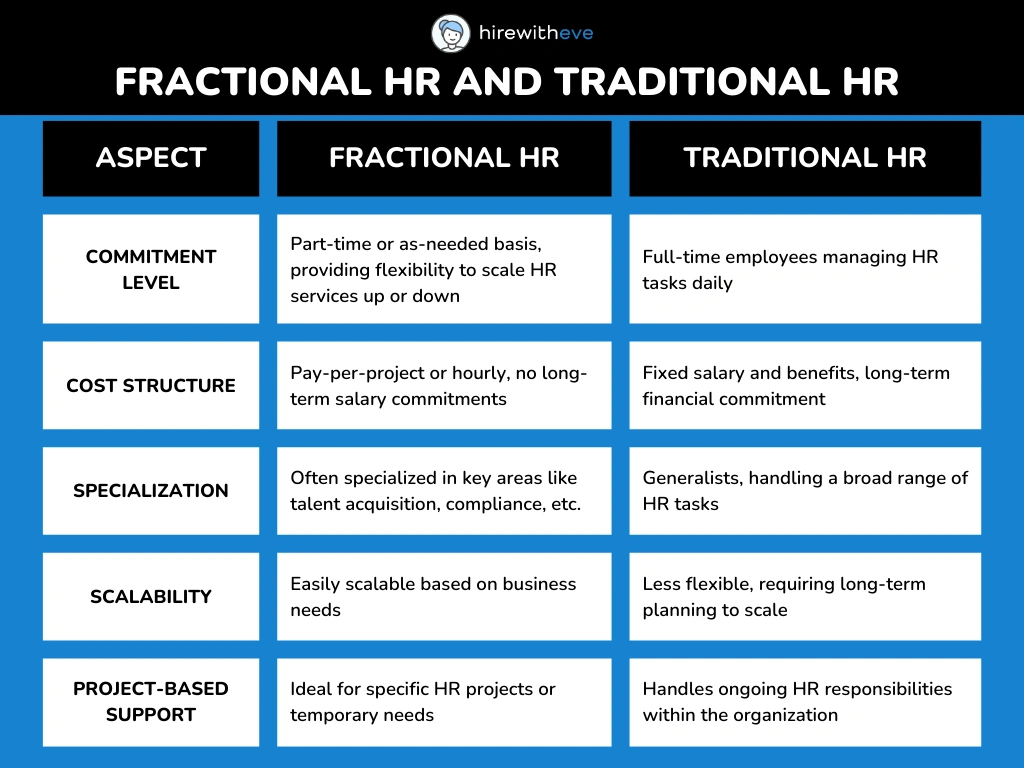What Is Fractional HR? All You Need to Know
What Is Fractional HR? All You Need to Know

In today’s fast-evolving workplace, companies are constantly looking for ways to optimize their HR functions without incurring the cost and complexity of a full-time HR department. Fractional HR has emerged as a flexible and cost-effective solution, allowing businesses to access high-level HR expertise without the need for a full-time hire.
This blog will walk you through everything you need to know about fractional HR, from what it is to when you should consider it for your business.
Table of contents
What Is Fractional HR?
Fractional HR refers to the practice of hiring an experienced HR professional on a part-time or contract basis to manage a company's HR needs. This is particularly useful for small to medium-sized businesses (SMBs) that require HR support but do not need a full-time HR department. Fractional HR professionals can provide the same expertise as a full-time HR leader but work on a flexible schedule, often serving multiple clients at once.
Unlike traditional HR hires, fractional HR allows companies to pay for only the services they need, whether it's help with recruitment, compliance, employee training, or talent management. This arrangement ensures businesses get high-quality HR support without breaking the bank.
Benefits of Fractional HR for Businesses
There are several key benefits of utilizing fractional HR, particularly for growing companies:
Cost-Effective: One of the main advantages of fractional HR is that businesses can save on the overhead costs associated with hiring a full-time HR team. Since fractional HR professionals are often paid on an hourly or project basis, companies pay only for the work completed.
Flexibility: Whether your company is scaling quickly or dealing with seasonal hiring needs, fractional HR offers flexibility. You can adjust the hours and services based on your current HR demands.
Expertise on Demand: By opting for fractional HR, businesses have access to HR professionals with specialized knowledge in areas like employee relations, benefits administration, and compliance. This can be especially beneficial for companies navigating complex regulatory environments.
Reduced Risk: HR compliance is crucial for any business. With fractional HR, companies can ensure that they are up-to-date on legal requirements and industry best practices, minimizing the risk of costly legal challenges.
When to Consider Fractional HR?
There are certain scenarios where fractional HR may be the ideal solution for your business. These include:
Rapid Growth: If your business is growing quickly and you're unsure how to scale your HR operations, fractional HR can help you manage this transition. An experienced HR professional can guide you through developing policies, hiring strategies, and ensuring compliance.
Budget Constraints: For startups and SMBs, hiring a full-time HR team can be costly. Fractional HR provides high-quality HR services without the financial burden of full-time salaries and benefits.
Special Projects: If you have specific HR projects, such as revising employee handbooks, updating compliance procedures, or conducting performance reviews, a fractional HR consultant can handle these tasks efficiently.
Lack of In-House Expertise: Smaller companies may not have the in-house HR expertise to deal with complex issues such as labor law changes, talent acquisition strategies, or benefits administration. Fractional HR provides access to this expertise on an as-needed basis.
Fractional HR vs. Traditional HR
While both fractional HR and traditional HR serve to manage a company’s human resources, there are notable differences in how they operate:

Survey: The Rise of Fractional HR
A recent survey conducted by HRTechInsights highlighted the growing popularity of fractional HR among small to medium-sized businesses. According to the survey:
45% of SMBs have considered using fractional HR services within the last two years.
30% of companies currently using fractional HR reported significant cost savings compared to maintaining a full-time HR department.
65% of businesses using fractional HR stated that it provided them with the flexibility needed to scale HR operations as their company grew.
These findings suggest that fractional HR is becoming an increasingly viable solution for companies that want to balance HR expertise with cost-effectiveness.
Conclusion
Fractional HR offers a powerful solution for businesses looking to maintain top-tier HR services without committing to a full-time hire. By tapping into fractional HR, companies can benefit from flexible, on-demand HR expertise that can scale with their needs.
If you're considering implementing fractional HR in your business, platforms like HirewithEve offer tools to streamline the recruitment and management of fractional HR professionals. HirewithEve helps businesses identify top talent, automate recruitment processes, and ensure that compliance and HR functions are executed seamlessly. Whether you're managing remote teams or navigating complex hiring needs, HirewithEve ensures you have access to the best HR resources, even on a fractional basis.
Target Your Talent
Unlock tailored solutions for your recruitment and hiring needs with Eve Platform's extensive case study library.
Subscribe now to enhance your HR expertise and excel in your role.
Free Resources

Transforming Hiring: 7 Key Recruiting Metrics
Enhancing recruitment processes with data-driven insights for better hiring outcomes.

Reducing Hiring Bias with Hirewitheve.
Utilizing Hirewitheve to combat bias and streamline recruitment processes effectively.

Hiring Detail-Oriented Candidates
HirewithEve enhances hiring by accurately assessing candidate's attention to detail-oriented.
